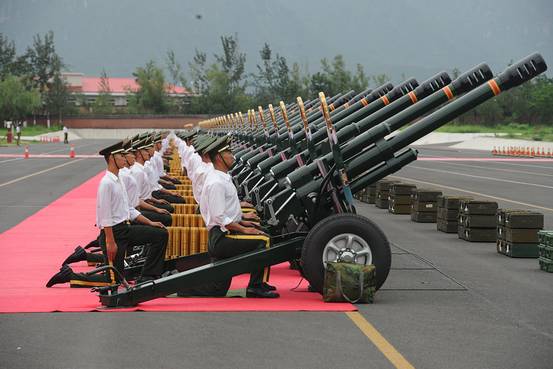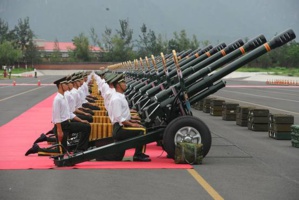A military parade will be the culmination of the celebration of the 70th anniversary of the end of World War II. Strictly speaking, the Japanese Instrument of Surrender was signed on September 2, 1945, but the tradition in China considers September 3 as the day of victory. And, the parade in Beijing is an event of exceptional importance for Chinese diplomacy.
For the Chinese leadership, it is important to remind the world and his own countrymen that China was in the anti-Hitler coalition during the Second World War. Moreover, Chinese leaders now seek to portray their country as one of the key allies of the winners. In regard to domestic policy of the Communist Party of China (CPC), it is also very beneficial to remind people of the days when the Communists were an integral and, as they now insist, the leading force of resistance to Japanese aggression.
Presence of the high foreign guests is important for China. Now Beijing is very similar to Moscow on the eve of May 9. Chinese diplomats have done everything to improve the representativeness of the upcoming celebrations. The results of their efforts came to light last week when official list of the leaders gathering in Beijing was published.
Leaders of most Western countries at the moment are not too friendly to China, and are not going to Beijing. For example, the parade will not be attended by Barack Obama. This does not mean that the Americans and their allies completely ignored Beijing, but they just sent officials and politicians of the second echelon. The only exception among EU countries - Czech President Milos Zeman. The well-known frondeur, he visited the Victory Day in Moscow a few months ago.
On the other hand, in addition to Russian President Vladimir Putin, Beijing is visited by leaders of several former Soviet republics - presidents of Belarus, Kazakhstan, Kyrgyzstan, Tajikistan and Uzbekistan. Yet, the leaders of the countries of the former USSR, which to some extent guided by the EU and the US, did not go to the parade.
First people in developing countries, interested in trade with China and Chinese investment, mounted the platform. We are talking about Burma, the Congo, the tiny Republic of Vanuatu and several other states.
Another group of distinguished guests will make the countries with which China has a traditional historical or ideological ties. In particular, those are presidents of Venezuela, Pakistan, Mongolia, Vietnam and Laos.
Leaders of the two neighboring countries are conspicuous by their absence in the list of participants: neither Japanese Prime Minister Shinzo Abe, nor North Korea leader Kim Jong-un attended the celebration. On the other hand, South Korea is represented by its president, Park Geun-hye.
Absence of Shinzo Abe is no surprise. In recent years, relations between China and Japan has been extremely tense, mainly because of the fierce territorial dispute over the Senkaku (Diaoyu). This argument, however, was exacerbated by the actions of both parties - for domestic reasons, both Beijing, and Tokyo are actively playing the nationalist card in an effort to rally the population in the face of real or imagined external threats. In addition, Japan, unlike Germany, still has mixed feelings about the end of World War II, and much less prone to repent for their past deeds. A trip to Beijing for the parade, dedicated to the victory over Japan, could create a lot of problems for Abe, as recently Japanese nationalism was significantly enhanced, and the notorious approach “pay and repent” is becoming more and more irritating.
As for the two Korean states, the situation is paradoxical. On the one hand, the celebration is attended by the South Korean President Park Geun-hye, whose father during the Second World War actually served as an officer in the ranks of the Imperial Japanese Army. On the other hand, the head of North Korea's Kim Jong-un refused to come to the celebration. His grandfather was the commander of the guerrillas, not too successful, despite the later official legend, but certainly brave.
However, the parade in honor of Victory Day is a political event, and the composition of its members is far more influenced by current politics, not things of bygone days.
From this standpoint, the presence in Beijing, September 3 of the supreme leader of South Korea, and the absence of his North Korean counterpart is rather understandable. For South Korea, China has already become the most important trading partner: South Korean trade with China exceeds the total turnover with Japan and the United States. Unlike Japan or, say, Vietnam, South Korea does not see the rising power of China as a direct threat, and is quite ready to maneuver between Washington and Beijing. Such a policy makes economic and strategic sense. It is not surprising that South Korea and China today have a very good relationship, and the trip to Park Geun-hye anniversary parade in Beijing confirms it.
Considerable tension appeared between Beijing and Pyongyang after coming to power of Kim Jong-un. China is dissatisfied with the policy of North Korea on the nuclear issue, Beijing is annoyed by the fact, that the reforms in North Korea, though begun, are extremely slow. In turn, North Korea does not trust China and struggles to find an alternative. Not surprisingly that China and North Korea are often exchanging diplomatic barbs, cooperation in many areas are frozen and Beijing significantly reduced the volume of public investment in the infrastructure of the DPRK.
In addition, Kim Jong-un is known for his reluctance to take part in the summits. For three and a half years of his reign, he did not meet any leader of a foreign country, and even refused to go to Moscow for the 70th anniversary of the Victory. It is clear that his visit to Beijing could not be expected. For the DPRK, Russia is now much more promising partner than China, but even this was not enough to overcome Kim Jong-un’s inherent allergic to official visits.
Original by Andrey Lankov, lenta.ru
For the Chinese leadership, it is important to remind the world and his own countrymen that China was in the anti-Hitler coalition during the Second World War. Moreover, Chinese leaders now seek to portray their country as one of the key allies of the winners. In regard to domestic policy of the Communist Party of China (CPC), it is also very beneficial to remind people of the days when the Communists were an integral and, as they now insist, the leading force of resistance to Japanese aggression.
Presence of the high foreign guests is important for China. Now Beijing is very similar to Moscow on the eve of May 9. Chinese diplomats have done everything to improve the representativeness of the upcoming celebrations. The results of their efforts came to light last week when official list of the leaders gathering in Beijing was published.
Leaders of most Western countries at the moment are not too friendly to China, and are not going to Beijing. For example, the parade will not be attended by Barack Obama. This does not mean that the Americans and their allies completely ignored Beijing, but they just sent officials and politicians of the second echelon. The only exception among EU countries - Czech President Milos Zeman. The well-known frondeur, he visited the Victory Day in Moscow a few months ago.
On the other hand, in addition to Russian President Vladimir Putin, Beijing is visited by leaders of several former Soviet republics - presidents of Belarus, Kazakhstan, Kyrgyzstan, Tajikistan and Uzbekistan. Yet, the leaders of the countries of the former USSR, which to some extent guided by the EU and the US, did not go to the parade.
First people in developing countries, interested in trade with China and Chinese investment, mounted the platform. We are talking about Burma, the Congo, the tiny Republic of Vanuatu and several other states.
Another group of distinguished guests will make the countries with which China has a traditional historical or ideological ties. In particular, those are presidents of Venezuela, Pakistan, Mongolia, Vietnam and Laos.
Leaders of the two neighboring countries are conspicuous by their absence in the list of participants: neither Japanese Prime Minister Shinzo Abe, nor North Korea leader Kim Jong-un attended the celebration. On the other hand, South Korea is represented by its president, Park Geun-hye.
Absence of Shinzo Abe is no surprise. In recent years, relations between China and Japan has been extremely tense, mainly because of the fierce territorial dispute over the Senkaku (Diaoyu). This argument, however, was exacerbated by the actions of both parties - for domestic reasons, both Beijing, and Tokyo are actively playing the nationalist card in an effort to rally the population in the face of real or imagined external threats. In addition, Japan, unlike Germany, still has mixed feelings about the end of World War II, and much less prone to repent for their past deeds. A trip to Beijing for the parade, dedicated to the victory over Japan, could create a lot of problems for Abe, as recently Japanese nationalism was significantly enhanced, and the notorious approach “pay and repent” is becoming more and more irritating.
As for the two Korean states, the situation is paradoxical. On the one hand, the celebration is attended by the South Korean President Park Geun-hye, whose father during the Second World War actually served as an officer in the ranks of the Imperial Japanese Army. On the other hand, the head of North Korea's Kim Jong-un refused to come to the celebration. His grandfather was the commander of the guerrillas, not too successful, despite the later official legend, but certainly brave.
However, the parade in honor of Victory Day is a political event, and the composition of its members is far more influenced by current politics, not things of bygone days.
From this standpoint, the presence in Beijing, September 3 of the supreme leader of South Korea, and the absence of his North Korean counterpart is rather understandable. For South Korea, China has already become the most important trading partner: South Korean trade with China exceeds the total turnover with Japan and the United States. Unlike Japan or, say, Vietnam, South Korea does not see the rising power of China as a direct threat, and is quite ready to maneuver between Washington and Beijing. Such a policy makes economic and strategic sense. It is not surprising that South Korea and China today have a very good relationship, and the trip to Park Geun-hye anniversary parade in Beijing confirms it.
Considerable tension appeared between Beijing and Pyongyang after coming to power of Kim Jong-un. China is dissatisfied with the policy of North Korea on the nuclear issue, Beijing is annoyed by the fact, that the reforms in North Korea, though begun, are extremely slow. In turn, North Korea does not trust China and struggles to find an alternative. Not surprisingly that China and North Korea are often exchanging diplomatic barbs, cooperation in many areas are frozen and Beijing significantly reduced the volume of public investment in the infrastructure of the DPRK.
In addition, Kim Jong-un is known for his reluctance to take part in the summits. For three and a half years of his reign, he did not meet any leader of a foreign country, and even refused to go to Moscow for the 70th anniversary of the Victory. It is clear that his visit to Beijing could not be expected. For the DPRK, Russia is now much more promising partner than China, but even this was not enough to overcome Kim Jong-un’s inherent allergic to official visits.
Original by Andrey Lankov, lenta.ru






